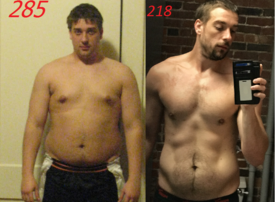Do you use Workout Calories?
Replies
-
Strength is not solely a function of LBM or muscle size. Neurons also play a determining role in how forcefully a muscle can contract.i'm down 90 pounds or so and i lift every day, do cardio every day and eat 1400 calories, with eating nothing back.
i don't understand why you'd want to eat back calories you burned off, what's the point in that?
and don't tell me "starvation mode" bs.
deficit = loss.
Congrats on losing LBM and fat along the way. You are roughly consuming 9800 calories weekly(not counting your 6 workouts and what is burned). Congratulations. at 285 your LBM was roughly 198, now it's 167.5; so while you've reduced your body fat you also drastically dropped your LBM; best of luck on what your attempting to do, but as has been recommended see a physician.
silly, i was >35% bodyfat at 285, so your numbers are wayyy off, i couldn't even bench 145, my lbm would have been significantly lower than your forum-math.
More importantly, i'm pretty happy with my current progress.0 -
I have not eaten any of my workout calories because I have a difficult time losing weight. Once I lose consistently I will eat more of the workout calories. It is nice to know the calories are there if I decide to eat them.0
-
OP: definitely eat exercise calories back for best results, if you don't lose, you probably are over-estimating your exercise calories or under estimating your food, so measure food and reduce exercise eat back and try again a few weeks, keep doing this, adjusting only food or exercise cals each time so you get an idea where your errors are coming from.
Now as for brdnw, I'm sorry to say that they are right here, even though being kind of rude to you. If your numbers are correct, you are losing lean muscle mass as well as fat, your deficit is way too high if you care about muscle mass. The math .65 * 285= 185lbs lean mass before, .85 * 198 = 168lbs lean mass now if I got your responses correct. The reason you don't notice it as much is most muscle mass is not in the chest or upper body, it is in the legs and back, and, part of gaining strength comes from reprogramming neurons and nerves on how to fire efficiently in a group to achieve maximal force.
For a way to prove it to yourself, try this. I bet you were able to hold say at least a light 15lb backpack or box or the like and go up the stairs quickly, or run for a short distance when you had more fat on you at 285lbs. So, for an example, try to hold just 117lbs (the amount you lost plus a light load, I'm sure you could carry a lot more than 15lbs then) and go quickly upstairs, go for a short jog here and there, go sit down with it in your lap, get up and down from a chair, get in your car with it...I bet this will be pretty rough and harder than it was when you had more fat on your body. Its also going to be pretty dangerous so...yeah maybe not try the stairs, but you get the point I hope. If you care about your lean body mass I'd increase your calories, take longer to lose and preserve your muscle.
Another way to look at it is what do you care about? If you just care about looks, well maybe you are doing OK, because most people just care about looks anyways and you will technically look better to most people with lower body fat faster. Most people have no clue what real strength looks like, they thing low body fat = strong because muscles show, but its not so at all, usually the reverse. Health wise and strength wise it will be better for you to slow down your loss and preserve your muscle: its much harder to put on than to take off. For another example, in high school my friend who ran cross country looked like he had muscly arms, while I was usually carrying a little extra weight and my muscles didn't show so much. He would struggle doing 25lb plates on a bar for bench press, I won the competition for bench pressing your own body weight as many reps as you can. He would barely be able to dead lift 1.5x his body weight, while I was able to dead lift 800lbs and had fun with a couple guys on the football team carrying the coach's car out into the field. But he LOOKED like he was "stronger" to many people because he was "cut". So I guess...which do you want? And even if you want to continue what you are doing, I'd be cautious recommending your current regimen, cutting lots of lean body mass for weight loss to any newbies for their sake!0 -
i'm editing out my initial antagonistic response.0
-
If you set yourself to sedentary on both the MFP method or any other - you should be eating back your calories as they are not included in your activity levels.0
-
I try not to eat any of my exercise calories if I can avoid it. That being said, I listen to my body. If I am hungry I will eat, whether or not I have extra calories from exercise sitting there.
That being said, I have quite a bit of weight to lose, and have several health risk factors which make it important to do so. I spoke to my doctor who advised me to go the way I am, and am keeping regular appointments with her.
You best bet if you have a lot of weight to lose would be to SEEK MEDICAL ADVICE. Ask 10 people on a forum a question and you will get at least 11 answers. Speak to someone who can check your health and wellbeing before advising you on what is best for YOU physically and emotionally, rather than looking for a one size fits all answer because there isn't one. Our bodies all work differently, and you need to check what is happening with yours with someone whose job it is to get you healthy before you can decide what is best.0 -
Yes, I eat back most of them. My settings are 'Lightly Active' and losing at 0.5lb a week, plus I add all the walking and workouts and I am losing comfortably without being hungry.0
-
It depends. First, if you aren't weighing your food, you don't have a good estimate of how much you ate. Second, if you're doing something intermittent, you probably have no idea how many calories you burned. Running and stationary bike and such do have relatively calculable calorie burns.
The question you might ask yourself is this: Is the general trend of my weight change satisfactory?
If it is, then do what you're doing. If you're losing weight too quickly, eat more. If you're losing weight too slowly, eat less.0 -
As explained above. If you're using the MFP method, it's already got the required deficit built in - so eat at least a proportion of your exercise cals back. If you're using the TDEE method, then your daily goal includes those exercise calories, so you don't eat them back.
MFP tends to overestimate calorie burns, so you may need to play around with numbers before working out what proportion you need to eat back to keep on track.
Personally, my walking calories are what fuel my wine drinking...
haha and min!0 -
Depends what activity setting you nominated when MFP asked you about your goals. If you included your exercise into that (e.g. moderately active, active) then you don't need to eat them back. That said, if you went with sedentary and have a daily calorie goal of 1200 and then you burn 600 calories through exercise your net calories for the day will only come to 600, which is far too low.
I lost 45 lb by eating back every one of my exercise cals while eating around net 1200 calories per day. Then I hit my goal, upped my calories to 1700 (which is higher than my TDEE) and for the last month I've been losing weight even faster than when I was eating 1200/day. Obviously the TDEE calculated for me on here isn't correct, but the fact I'm losing more weight while eating more is a hint to me that even net 1200 calories total was too low.0 -
If you are hungry and have the calories then eat....if not don't. You have to learn how to read the signals that your body is giving you.0
-
I eat mine back. 50% sometimes, 75 % sometimes.. on the weekends close to 100%. I am doing the 1200 and eating back calories. But with that I'm still staying below my tdee-20% which is 1564 except on the weekends, which I usually burn about 600-750 with gym, and then other physical activities like long dog walks and yard work etc..so I eat more then too0
-
I've spoken with a couple different people regarding this, and they told me to remain at my calorie intake goal, and not to exceed that goal after working out. Even though you earn "extra" calories after working out, you still need to ingest only the recommended amount of calories to see the best results. It works either way, but to see the best results, I leave those earned calories alone and do my best to remain at my recommended 1200.0
This discussion has been closed.
Categories
- All Categories
- 1.4M Health, Wellness and Goals
- 398.2K Introduce Yourself
- 44.7K Getting Started
- 261K Health and Weight Loss
- 176.4K Food and Nutrition
- 47.7K Recipes
- 233K Fitness and Exercise
- 462 Sleep, Mindfulness and Overall Wellness
- 6.5K Goal: Maintaining Weight
- 8.7K Goal: Gaining Weight and Body Building
- 153.5K Motivation and Support
- 8.4K Challenges
- 1.4K Debate Club
- 96.5K Chit-Chat
- 2.6K Fun and Games
- 4.8K MyFitnessPal Information
- 12 News and Announcements
- 21 MyFitnessPal Academy
- 1.5K Feature Suggestions and Ideas
- 3.2K MyFitnessPal Tech Support Questions












